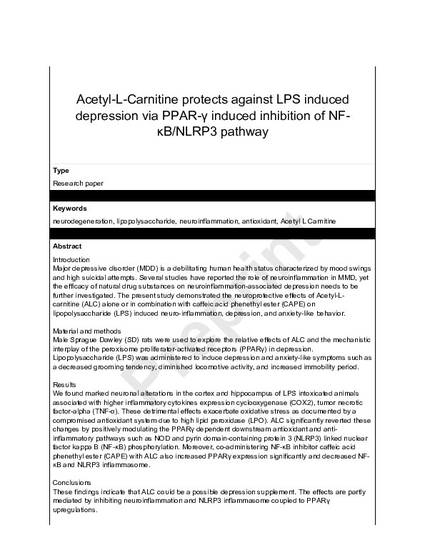
Introduction Major depressive disorder (MDD) is a debilitating human health status characterized by mood swings and high suicidal attempts. Several studies have reported the role of neuroinflammation in MMD, yet the efficacy of natural drug substances on neuroinflammation-associated depression needs to be further investigated. The present study demonstrated the neuroprotective effects of Acetyl-L- carnitine (ALC) alone or in combination with caffeic acid phenethyl ester (CAPE) on lipopolysaccharide (LPS) induced neuro-inflammation, depression, and anxiety-like behavior. Material and methods Male Sprague Dawley (SD) rats were used to explore the relative effects of ALC and the mechanistic interplay of the peroxisome proliferator-activated receptors (PPARγ) in depression. Lipopolysaccharide (LPS) was administered to induce depression and anxiety-like symptoms such as a decreased grooming tendency, diminished locomotive activity, and increased immobility period. Results We found marked neuronal alterations in the cortex and hippocampus of LPS intoxicated animals associated with higher inflammatory cytokines expression cyclooxygenase (COX2), tumor necrotic factor-alpha (TNF-α). These detrimental effects exacerbate oxidative stress as documented by a compromised antioxidant system due to high lipid peroxidase (LPO). ALC significantly reverted these changes by positively modulating the PPARγ dependent downstream antioxidant and anti-inflammatory pathways such as NOD and pyrin domain-containing protein 3 (NLRP3) linked nuclear factor kappa B (NF-κB) phosphorylation. Moreover, co-administering NF-κB inhibitor caffeic acid phenethyl ester (CAPE) with ALC also increased PPARγ expression significantly and decreased NF-ᴋB and NLRP3 inflammasome. Conclusions These findings indicate that ALC could be a possible depression supplement. The effects are partly mediated by inhibiting neuroinflammation and NLRP3 inflammasome coupled to PPARγ upregulations.
- Neurodegeneration,
- Lipopolysaccharide,
- Neuroinflammation,
- Antioxidant,
- Acetyl L Carnitine
Available at: http://works.bepress.com/lina-alkury/46/